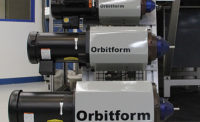Lean manufacturing was not a concern for Mark DeWys in 1977 when he founded DeWys Manufacturing Inc. in Grand Rapids, MI. The focus of his one-man shop back then was the fabrication of fireplace inserts, racks and various small metal parts.
Nearly 40 years later, however, lean manufacturing techniques enable the 150-employee DeWys group of companies (now based in Marne, MI) to provide sheet metal, machining, powder coating, contract manufacturing and product assembly services to more than 160 companies serving 11 industries throughout the United States.
Current CEO Jon DeWys (Mark’s younger brother) says lean manufacturing helps each company produce high-quality products with shorter lead-times, while meeting each customer’s application requirements. The DeWys approach to lean manufacturing, which dates back to 1997, encompasses several programs: 6S, kata, reducing waste, pull systems, kanban, visual management and value-stream mapping.
“We started small with lean, and hired an outside consultant to begin our journey,” explains Jon DeWys. “But, we quickly realized that we wanted to do it our own way.”
On the assembly side of the business, equipment cost-effectiveness is essential to operate lean. This past January, for example, DeWys purchased a model B-310 orbital riveter that creates hinge joints and expands the company’s fastening capabilities beyond break-stem blind rivets. Made by Orbitform LLC, the machine quickens the assembly of furniture, medical equipment and other products.
Orbital riveting is a cold-forming process that involves applying pressure to a rivet head with a job-specific peen tool held at a fixed angle. With each rotation of the tool, the rivet head is progressively formed. Orbitform says this process requires about 80 percent less forming force than a standard press.
The B-310 benchtop machine is designed for orbital riveting medium-size parts. It features an HMI touch panel with enhanced diagnostics and an electric powerhead that holds the peen tool. The powerhead is fixtured in the machine’s adjustable column and has a maximum stroke distance of 2 inches. Once the tool touches the rivet head, it applies up to 2,120 pounds of downward force at 100 psi.
DeWys operators use the B-310 on parts requiring rivet heads that are 0.84 inch in diameter, although the machine can form heads greater than 1 inch in diameter. A T-slot in the column base allows for easy mounting of a fixture to hold the part.
Pneumatic solenoid valves ensure fluid powerhead motion, and a dual-pilot-operated directional valve prevents powerhead drifting. The machine’s air supply is kept clean with a filter regulator.
“Value stream mapping is another important lean tool for us, and it happens both in the front office and on the shop floor,” notes DeWys. “It’s all about optimizing a process that [lets us] make the product faster, easier and at a lower cost—and doing the process the same way each and every time.”
For more information on orbital riveting machines, call 800-957-4838 or visit www.orbitform.com.






